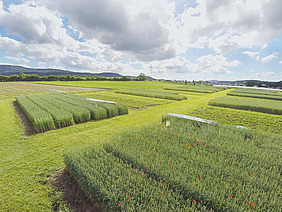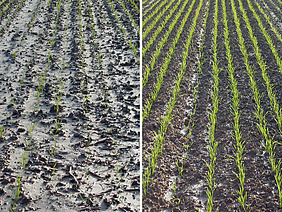(Frick, 06.02.2025) Organic farming has characteristics that enable efficient and environmentally friendly production. This is shown by a joint study by FiBL Switzerland and Agroscope in collaboration with ETH Zurich - recently published in the journal "Scientific Reports".
"The meticulously collected data from 40 years proves that organic farming promotes biodiversity and soil fertility. It also reduces the risk of negative environmental impacts from pesticides or nitrogen surpluses," reports Hans-Martin Krause from FiBL, one of the two main authors of the study and co-leader of the trial since 2024.
Globally unique field trial
The study is based on data from a globally unique field trial. This is known as the "DOK trial" and compares the biodynamic (D), organic (O) and conventional (K) cultivation systems in Switzerland. To this end, organic and conventional farming systems have been scientifically compared with each other on a field in Therwil in the canton of Basel-Landschaft since 1978.
Organic farming favours soil fertility
The organic soils were found to have 16 per cent higher humus content and up to 83 per cent higher activity of soil organisms, both of which have a positive effect on soil structure. A healthy soil structure helps to store water and reduce soil loss through erosion. In all systems, manure from livestock farming is crucial for good soil fertility. If it is applied to the field in sufficient quantities, preferably in the form of compost, the humus content remains stable or increases in all systems. However, if, as in one of the conventional systems studied, fertiliser is applied exclusively in the form of synthetic mineral fertiliser, the humus content decreases. On the other hand, the phosphorus content in organic soils decreases more than in conventionally farmed soils due to the lower fertiliser application, which shows the need for phosphorus supply via recycled fertiliser in order to avoid phosphate deficiency in organic farming in the long term.
"It is striking that the biodynamic system performs best in terms of soil fertility, humus formation and climate impact," says Paul Mäder, co-lead author of the study and long-time co-leader of the DOK trial. "The special feature of this system is the composting of the manure and the use of plant-based preparations.
Efficiently produced yields with yield gaps
The long-term data from the DOK trial shows that, on balance, organic systems are efficient. On average, organic systems produce 85 per cent of conventional yields - with only eight per cent biocompatible pesticides and 65 per cent nitrogen input via fertilisers. Nitrogen, in particular, is one of the most important plant nutrients, but also one of the most critical for the environment. Excess nitrogen can end up in groundwater or as greenhouse gases in the atmosphere.
Soya delivers equally high yields in all systems. Small differences in yield are measurable for forage crops such as clover grass and silage maize. The differences are greatest for crops such as wheat and potatoes. Overall, yields fluctuate significantly more in organic systems, which is due to the lower use of fertilisers and pesticides. On the other hand, the risk of pollutants contaminating water, food and animal feed is significantly lower.
Climate impact of organic farming: better per area, per product
The lower use of nitrogen fertilisers is the main factor in the improved climate impact of organically farmed soils. If nitrogenous fertilisers are present in excess in the soil, they are converted by microorganisms into nitrous oxide, which has a high impact on the climate. Organic soils, therefore, produce significantly lower emissions per unit area. However, due to the lower organic yields, the nitrous oxide emissions per product unit are similar to those of conventional systems, except for the biodynamic system. Because organic soils store more CO2 in the humus, the climate impact is further improved.
Key for the future: nutrient cycles, robust varieties and diversification
In summary, the study shows that organic farming offers a viable basis for the further development of sustainable farming systems that balance food production and environmental impact.
"The potential for the further development of organic farming lies above all in closing inter-farm nutrient cycles and making significant progress in plant breeding," says Jochen Mayer, a scientist at Agroscope and co-leader of Agroscope's DOK trial. "This includes the recycling of phosphorus and nitrogen, for example, from food waste or wastewater. We also recommend diversification strategies in plant cultivation, such as mixed crops, undersown crops or strip cropping, ideally with perennial crops."
Facts about the DOK trial in Therwil, Switzerland
- The world's longest-running exact scientific trial comparing organic and conventional cultivation systems - since 1978 in collaboration between FiBL and Agroscope.
- To date, there have been more than 140 peer-reviewed scientific publications on the DOK trial as well as numerous master's and doctoral theses.
- The DOK trial serves as a model for numerous comparative system trials worldwide. These include the FiBL long-term "SysCom" trials in Bolivia, India and Kenya and the Agroscope FAST and Burgrain trials.
Further information
The study in an easily understandable form
FiBL is making the results of the new study available in various formats:
- Detailed dossier on the results of 45 years of DOK trials:
- fibl.org: The DOK Trial
- fibl.org: Der DOK-Versuch
- fibl.org: L’essai DOC
- fibl.org: La sperimentazione DOK
- fibl.org: El ensayo DOK
- fibl.org: Podcast "The DOK trial - Growing systems in comparison" (in German)
- fibl.org: Webpage about the DOK trial
FiBL contacts
- Hans-Martin Krause, DOK Co-Leader since 2024
- Paul Mäder, DOK Co-Leader until 2023
+41 79 346 18 86, paul.maeder(at)fibl.org - Franziska Hämmerli, Media Spokesperson FiBL Switzerland
Agroscope contacts
- Jochen Mayer, DOK Co-Leader since 2007
+41 58 468 72 14, jochen.mayer(at)agroscope.admin.ch - Marc Andrey, Media Spokesperson Agroscope Switzerland
+41 58 485 68 21, marc.andrey(at)agroscope.admin.ch
Main sponsor of the DOK trial
- Federal Office for Agriculture (FOAG)
- Federal Office for the Environment (FOEN)
- Swiss National Science Foundation (SNSF)
- State Secretariat for Education, Research and Innovation (SERI)
Main partners of the DOK trial
- ETH Zurich
- University of Basel
Current study
Krause, H. M., Mäder, P., Fliessbach, A., Jarosch, K. A., Oberson, A., & Mayer, J. (2024). Organic cropping systems balance environmental impacts and agricultural production. Scientific Reports 14, 25537. https://doi.org/10.1038/s41598-024-76776-1
Further studies on the DOK trial
- Knapp, S., Gunst, L., Mäder, P., Ghiasi, S., & Mayer, J. (2023). Organic cropping systems maintain yields but have lower yield levels and yield stability than conventional systems - Results from the DOK trial in Switzerland. Field Crops Research, 302. https://doi.org/10.1016/j.fcr.2023.109072
- Krause, H. M., Stehle, B., Mayer, J., Mayer, M., Steffens, M., Mäder, P., & Fliessbach, A. (2022). Biological soil quality and soil organic carbon change in biodynamic, organic, and conventional farming systems after 42 years. Agronomy for Sustainable Development, 42. https://doi.org/10.1007/s13593-022-00843-y
- Oberson, A., Jarosch, K. A., Frossard, E., Hammelehle, A., Fliessbach, A., Mäder, P., & Mayer, J. (2024). Higher than expected: Nitrogen flows, budgets, and use efficiencies over 35 years of organic and conventional cropping. Agriculture, Ecosystems & Environment, 362. https://doi.org/https://doi.org/10.1016/j.agee.2023.108802





